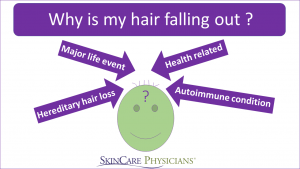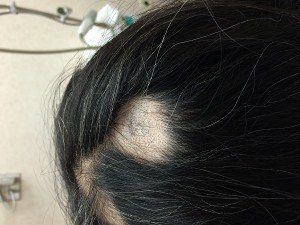- Home
- Blog
- Hair Treatments
- Why is my hair falling out?
Why is my hair falling out?
 Patients at SkinCare Physicians ask from time to time about hair loss. First of all, no need to panic if you see some hair fall out. It is normal to lose 50-100 hairs a day. However, there are times when more hair falls out at a faster rate. Here are some of the frequent causes of hair thinning and ways our dermatologists can help patients in the Boston area.
Patients at SkinCare Physicians ask from time to time about hair loss. First of all, no need to panic if you see some hair fall out. It is normal to lose 50-100 hairs a day. However, there are times when more hair falls out at a faster rate. Here are some of the frequent causes of hair thinning and ways our dermatologists can help patients in the Boston area.
Major life event
Telogen effluvium is a condition in which diffuse hair loss occurs about three months after a major life event such as getting married, giving birth to a baby, undergoing major surgery, or illness. Even diet or emotional stress can trigger telogen effluvium. People typically notice an overall thinning of hair throughout the scalp. The good news is that it resolves usually in 6 months with spontaneous new hair growth. No intervention or treatment is needed.
Hereditary hair loss
 Male or female pattern hair loss, otherwise known as androgenetic alopecia, is another common hair loss condition that is seen in the office. Men who have this may notice thinning on the top of the scalp and/or the front of the scalp. Women may also notice thinning of these areas but the frontal hairline is usually intact. Many times, people with androgenetic alopecia notice that it feels fuller on the back of their scalp than on the front or top of their scalp. Treatments such as topical minoxidil can help reduce loss and stimulate hair growth. Systemic medications such as finasteride or spironolactone can also be helpful.
Male or female pattern hair loss, otherwise known as androgenetic alopecia, is another common hair loss condition that is seen in the office. Men who have this may notice thinning on the top of the scalp and/or the front of the scalp. Women may also notice thinning of these areas but the frontal hairline is usually intact. Many times, people with androgenetic alopecia notice that it feels fuller on the back of their scalp than on the front or top of their scalp. Treatments such as topical minoxidil can help reduce loss and stimulate hair growth. Systemic medications such as finasteride or spironolactone can also be helpful.
Autoimmune condition
If you notice hair loss in a specific, localized area, you may have alopecia areata. Alopecia areata is an autoimmune condition in which the immune system attacks hair follicles. Alopecia areata can affect small or large areas and can be triggered by stress or be associated with other autoimmune diseases. It tends to respond very well to treatment with small injections of anti-inflammatory medicine into the focal areas of hair loss. There are also systemic medications that help in some cases. The earlier you start treatment, the better chance you have of stimulating hair re-growth and reversing the loss.
Health related hair loss
Laboratory tests can be helpful to determine whether there are other conditions that may be contributing to hair loss. Medications can also cause hair loss. Hair loss is usually reversed once the medication is discontinued or when the underlying health condition improves.
So if you’ve been noticing that you’re losing a lot more hair than usual, get it checked out by a dermatologist. Starting treatment early makes a difference!



Leave a Reply